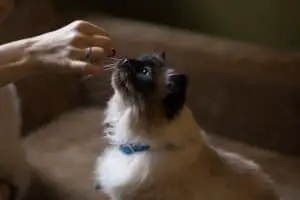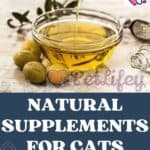
Supplements and vitamins for cats? Let’s find out which nutrients are best for your health, when and how they should be used.
The feeding of the feline must always be well studied for its conditions and its nutritional needs. A healthy and balanced diet, varied as much as possible (with some small rewards every now and then) is ideal for ensuring lasting health and well-being to the furry pet. But it is not always enough to vary and choose good products, so supplements and vitamins for the cat come into play. We read better here in the article.
Supplements and vitamins for cats: supplements for every problem
When a normal diet is no longer enough, supplements offer themselves as extra support for the body and energy of the cat. There are different types of supplements, perfect for any type of ailment but it is important to know when and how they should be administered to the pet furry, to avoid making mistakes. Let’s see specifically below.
In the daily diet of the feline it may happen that the foods offered in their variety and quality are not enough to support its energy needs, especially if you are used to home diets.
These diets, among other very common ones, which involve cooking foods or, in any case, keeping them warm, cause the vitamins contained within them to be lost and the consequence consists in the possible vitamin deficiency in the cat.
For this reason, it is necessary to opt for the use of supplements and vitamins for the cat, where necessary. We must know, in fact, that these support substances should be administered only in the presence of deficiencies in the hairy.
The supplements, as the word itself suggests, go to ‘integrate‘ the nutritional substances that the cat is unable to assimilate in its daily diet. Several feline supplements and vitamins are found in stores and on the internet and are very popular.
But when should supplements be used? And which ones should be chosen? Let’s see well here.
In case of food shortage it is good to check the state of the cat by bringing it to medical supervision. The veterinarian will examine his condition with all the required tests and, analyzing his diet, will prescribe the specific supplements to be taken.
Supplements for the intestine
Intestinal supplements for the furry are among the most popular and are divided into: prebiotics, probiotics and symbiotic supplements (mixed).
The prebiotic supplement is a food that includes fiber, which is not digestible by the cat but can be used by the intestinal bacteria favored by it; it is also found inside the feed.
The probiotic supplement, on the other hand, is administered to counteract harmful bacteria in the animal. An example of a probiotic is lactic ferments.
There is also insoluble fiber, useful for stimulating bowel movement. This is used in case of cat diarrhea or to soften its feces. Before administering this type of supplement to the feline it is important to have it examined to see if it is appropriate.
Organ supplements (kidneys, liver, joints)
We find liver supplements for animals, those for kidney failure in cats, as well as those for their joints. Your cat doesn’t necessarily need the supplement, though. Even in this situation, a medical opinion and authorization to proceed with the integration is still required first.
Supplements for the immune system
In the case of diseases that lower the animal’s immune defenses, such as FIV or other infectious diseases, the use of supplements that strengthen its metabolism and its entire body is recommended.
These particular supplements, however, can improve or worsen the already weak condition of the cat, therefore it is essential to consult a doctor for their administration.
Mineral supplements
Even with mineral supplements for the feline you have to be very careful. Administering a mineral can damage the animal’s health and compromise it even more. It must be the veterinarian who identifies the deficiency and prescribes a therapy.
Usually, the mineral that your cat is most deficient in is calcium. Only the doctor will be able to suggest the right dietary supplement and the possible modification of his diet.
The feline and the integrated diet: vitamins and taurine

A similar argument can be made regarding the intake of vitamins by the domestic cat. Let’s see where they can be found in nature and in which foods the vitamins are contained and how to behave before their administration.
Vitamins also play an important role in maintaining the good health of your cat. Kitty can take vitamins by feeding on its prey, when it happens to hunt, while in home diets it can find some in the organs and in the meat.
The normal kibble for the feline, vitamins are added synthetically and are defined nutritional additives, shown behind each package.
Before providing a multivitamin supplement to the cat, it is advisable to carefully read which vitamins are present in the feed and first ascertain an actual deficiency in the furry dog.
One substance that the feline must necessarily integrate from the outside is taurine. This is as basic to him as a vitamin. An essential amino acid in proteins, it is present in raw meat or in cat food (kibble).
Your vet may recommend that you give your pet taurine in pill, powder, or paste form.






